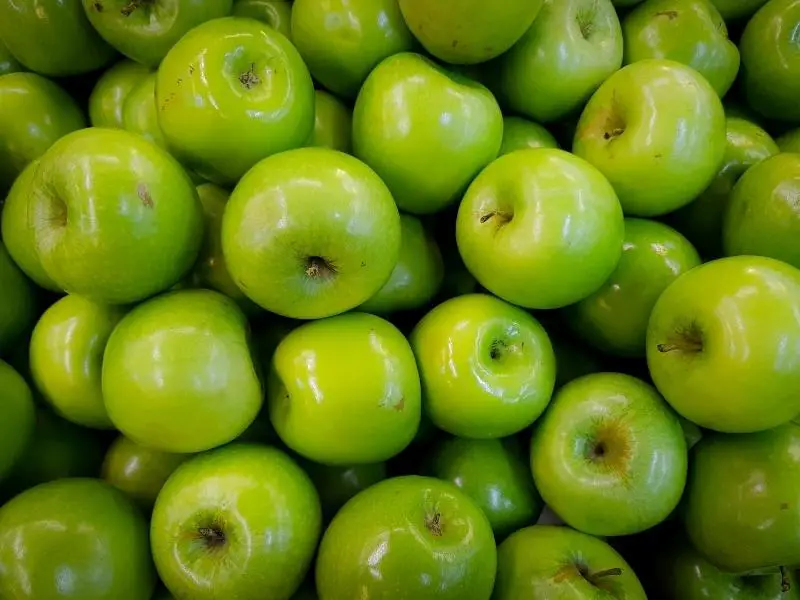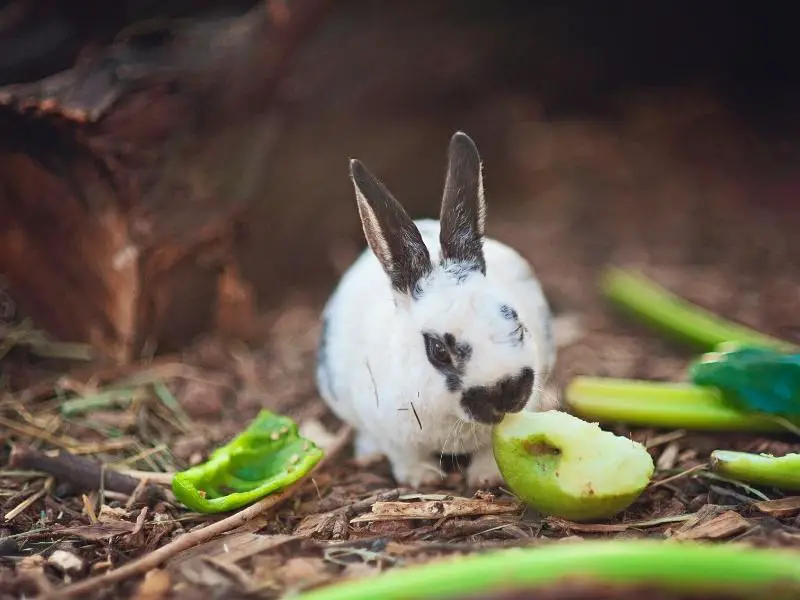“An apple a day keeps the doctor away.” Have you ever wondered if this was true for your pet rabbit as well? Apples are sweet, and crunchy, and have many health benefits for humans. Surely, it must be good for rabbits too.
So can rabbits eat apples?
Rabbits can eat apples in small quantities. Apples are one of the best fruit options to give rabbits as a snack or treat. However, the seeds and stems of apples are toxic to rabbits as they contain cyanogenic glycosides (a poisonous compound). This compound can cause death in severe cases.
If you are looking for healthy and delicious snacks for your rabbit, but you are concerned about the safety of offering apples as a snack, then this guide has all the information you will need.
Can Rabbits Eat Apples with Skin?
The short answer is yes, your bun can safely eat the skin of an apple, as long as it’s washed thoroughly to remove any pesticides or chemicals.
In fact, the skin is the most nutritious part of the apple for rabbits. Nearly all of the fiber and antioxidants come from the skin of an apple.
Add a variety of apples and colors to your bun’s diet for a nutritious treat. Here are a few types of apples that are great options:
- Honeycrisp
- Granny Smith
- Gala
- Red Delicious
- Cripps
- Pink Lady
- Empire
Remember that most rabbits refuse to eat green apples because they are sour and not as sweet as red apples. It’s vital to ensure you remove the apple core, seeds, and stems when giving your bun an apple as a snack or treat.
The stems and seeds of an apple contain a compound called cyanogenic glycosides, which is toxic to rabbits if ingested.
Look out for these symptoms if you suspect your floppy-eared friend has eaten the seeds or stems of an apple:
- Diarrhea
- Upset tummy
- Continuous vomiting
- Shaking, trembling, or convulsions
- Trouble breathing
- Slow or shallow heart rate
Seek veterinary advice immediately if your bun presents with these symptoms, as this can be life-threatening if left untreated.
Benefits of Feeding Apples to Rabbits

Besides being super tasty, this crunchy fruit provides rabbits with many nutritional benefits (especially the apple’s skin).
Here’s a closer look at a few benefits of feeding apples to rabbits:
- Apples contain dietary fiber, which is excellent for gut health and helps fight against heart disease.
- Apples are also packed with phytonutrients, which help a rabbit’s body fight off infections and diseases.
- Apples contain B-complex vitamins such as vitamin B6, riboflavin, and thiamin. These vitamins maintain red blood cell health and improve the rabbit’s nervous system.
- Apples are a good source of potassium, which helps ensure there are enough fluids in your bun’s body for maximum growth.
- Calcium is also found in apples, which assists with making stronger bones and teeth.
- Apples are an occasional tasty treat for rabbits and make good rewards when training your bun.
Risks of Feeding Too Many Apples to Rabbits
To avoid the dangerous effects of overeating, fruits and vegetables should always be given in limited quantities to rabbits.
Let’s take a look at some of the risks of feeding too many apples to pet rabbits:
- Apples are high in sugar, which means they are acidic. The acid is terrible for your bun’s teeth and causes dental problems.
- The high sugar content in apples can also lead to digestive issues such as gastrointestinal stasis (GI stasis), vomiting, diarrhea, and obesity.
- Apples are also a source of vitamin C, which can be problematic if your bun overeats apples. Too much vitamin C can lead to kidney damage, as your bun also produces its own levels of vitamin C.
How Many Apples Can I Give to My Rabbit?
Your floppy-eared friend has a sensitive digestive system. Due to the high sugar content in apples, you must only give your bun about 1 to 2 slices once a week.
Remember, fruit should make up less than 5% of your bunny’s diet.
Never be tempted to feed your bun a whole apple, as there is a high chance they will eat the entire thing. Rabbits naturally have a sweet tooth, and an apple makes a tasty treat for them.
Let’s take a look at some tips on how to feed apple to your bun:
1. Always wash the apple thoroughly or peel it (there may be pesticides or chemicals on the skin).
2. Cut the apple into small portions.
3. Remove the core, seeds, and stem.
4. Monitor your bun’s poops to make sure they are not allergic to apples.
Can Baby Rabbits Eat Apples?
Baby rabbits shouldn’t be fed apples as their delicate digestive systems are still developing. Their diet should strictly consist of their mother’s milk, which will provide them with all the nutrients they need.
When a baby rabbit starts eating solid food around 4 weeks old, it will begin with small amounts of hay. Their sensitive tummies will be unable to handle the sudden high levels of sugar, potassium, and vitamins found in apples.
Feeding your rabbit apple will lead to serious digestive issues such as vomiting, diarrhea, and gastrointestinal stasis. In severe cases, this can lead to death.
You should only start offering limited amounts of fruit to a baby bun when they are around 3 months old. Even then, introduce any new foods slowly to avoid making your bun sick.
My Last Bunny Thoughts
Apples are a healthy option for your floppy-eared friend as a treat or snack. They are packed with nutrients and are bursting with flavor, but you mustn’t allow your bun to overeat apples. Be sure to limit their intake of this tasty fruit.
Remember to remove the core, seeds, and stems, as you don’t want your bunny to chew or swallow any of these accidentally. Make sure to use raw and fresh apples. When you cook apples, they lose their fiber content, and the sugar level increases.
Rabbits suffer from vitamin B6 deficiency, which will lower their growth rate. Apples are a great addition to your bun’s diet to prevent this, and rabbits love apples.
At the end of the day, a healthy tummy means a healthy bunny.
Related Articles:

